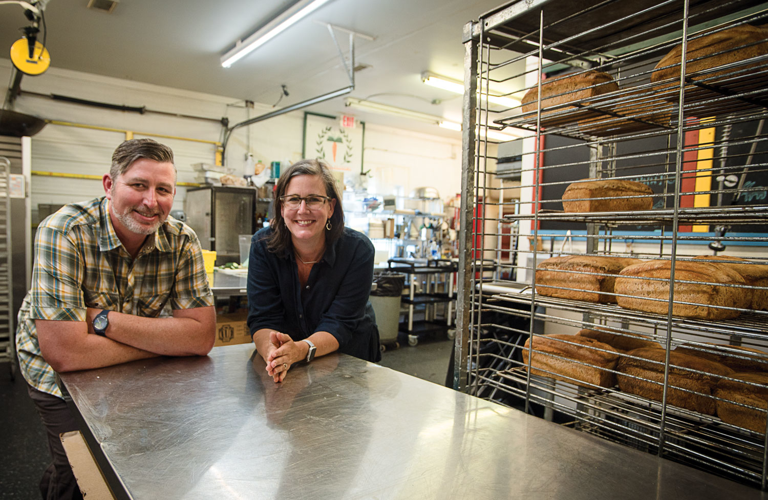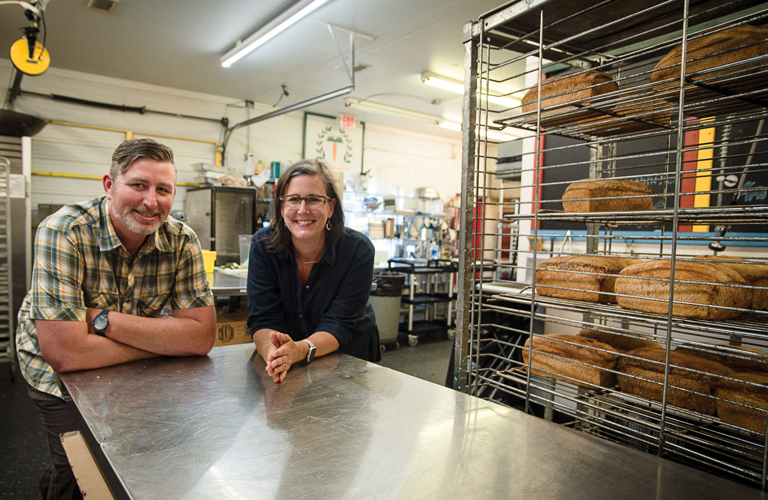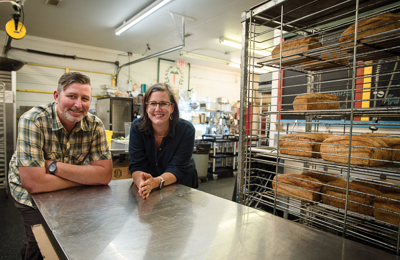
Grant and Laura Wilson
As Nashville’s food scene has evolved, so has the career of chef Laura Wilson. Though her journey started in her hometown of Chattanooga (where she became a head chef at 23) and New Orleans (where she became an executive chef by age 28), Nashville is where she has made a major impact.
Wilson moved here in the Aughts, working in places like Gep Nelson’s fine-dining spot Wild Iris and becoming a high-profile female chef in a notoriously male-dominated profession — an impact that was doubled when she and another female culinary veteran, Kim Totzke, served as co-chefs at the pioneering bistro Ombi. (Though it’s been closed for eight years now, Ombi is still much missed.)
Then a few years ago, as she looked for ways to flex her creative muscles with a slightly less grueling schedule (she’s now a mom), Wilson started consulting for other people’s restaurants. She helped design the inaugural menu for groundbreaking dinner-and-cocktails spot Holland House in East Nashville, and she was also in on the boom in the Gulch — she helped launch the hugely popular hot bar and deli at the Turnip Truck market there.

Sam Tucker of Village Provisions at work at Citizen Kitchens
Looking to contribute more to Nashville’s growth, Wilson then literally took a job with the city, running the Grow Local Kitchen at the municipally owned Nashville Farmers’ Market, where she helped connect local farmers to restaurateurs seeking fresh ingredients, and recruited many of her chef friends to teach classes at the market.
The Grow Local Kitchen is also a culinary incubator; it provides a place for small businesses to develop and produce food products. And with food trucks and new artisan food businesses constantly rolling out in Nashville, the demand for such incubators has boomed.
Two years ago, Wilson stepped out on her own as an entrepreneur, opening Citizen Kitchens, her own 2,800-square-foot incubator on Charlotte Pike in West Nashville.
“Working at the Nashville Farmer’s Market, I saw all of the small food artisans who would come in and want to launch their businesses — they had a lot of trouble finding production space,” Wilson says. “If someone looked to do this on their own, then they were looking at, bottom, 50 grand to build out a kitchen and to do all this. This way, you could start a small food business for around $500.”
Wilson opened Citizen Kitchens with food entrepreneurs Jenny Vaughn and Brent Ling (she’s since bought them out), and it proved to be an immediate success. With 30 tenants sharing the facility (either via a membership or renting space by the hour), it currently has a months-long waiting list.
It’s a marvel of creative scheduling to have that many businesses working out of the small, cheerful space on Charlotte. Wilson has brought in her husband, Grant Wilson, to help run the operations — he jokes that it requires a shoehorn to accommodate everyone. Laura Wilson compares it to a giant game of Tetris.
That’s why the Wilsons are getting ready to open a second, much larger Citizen Kitchens facility in East Nashville, which will have 8,000 square feet and accommodate a whopping 100 tenants. It’s being developed in partnership with the Fresh Hospitality restaurant group.
The new business, expected to open in early 2018, will fill the lower level of Hunters Station, the much-anticipated dining complex that Fresh Hospitality is building on the former Hunters Custom Automotive site at 10th and Main streets in the hot Five Points neighborhood. It will include an additional kitchen that’s gluten-free, and a micro dairy.
Explaining why Citizen Kitchens has proven so popular, Wilson says it offers not just the utilitarian requirements of opening a food business, but also “intangibles.”
“Culture is so important in kitchens,” she explains. Citizen Kitchens aims to “set the kind of culture where people aren’t running into each other, but also feel like they’re part of the community.” Part of Wilson’s pitch to prospective tenants is that Citizen Kitchens offers consulting services on various aspects of running a food business. But in addition, the kitchen’s neophyte clients get to work alongside more experienced chefs — they get to see the pros at work.
That attention to kitchen vibe comes at a time when the culture of restaurant kitchens across America is being deliberately remade to reflect a more inclusive society — the raunchy, cutthroat pirate-ship mentality doesn’t work anymore. New York chef David Chang has described it as a struggle to move from the “dark side” of kitchen culture (brutal and single-minded) to the “light side” (empathetic and compassionate).
“I like being able to keep the liberty part of being a chef without all of the illegal stuff,” like harassment and bullying, Wilson says. “From an HR standpoint, and from a personal safety standpoint.”
“Harnessing that spirit of it, of being a little bit of a rebel, driving your own ship, those are the things that make a good culture,” she adds. “That culture goes down to whether you refill the paper towels when they’re empty, you know. You can tell how people feel about where they are and what they’re doing if they replace a garbage bag.”
Wilson elaborates on the theory of creating a space that helps foster the hard work and creativity that a food business requires: “If you’re in a place that looks terrible and is not clean and feels terrible, then you feel terrible and you don’t clean.” The goal is “becoming a place that’s clean and bright, and has people there having fun, and listening to music, and probably listening to some terrible comedy, you know.”

Jason Norton of Sifted
I dropped by the West Nashville kitchen on a recent Saturday, and the vibe was busy but relaxed. A few cooks were at work on their projects. One was cleaning up at the dishwashing station. I took a stroll through the walk-in cooler, filled with all kinds of tempting ingredients that clients stash for storage at the proper temperature. (Citizen Kitchens' health score of 100 is pinned on a wall.)
As people worked, Sam Tucker, the veteran chef behind Village Provisions, cranked up local rock as background music. The Wilsons chatted with me and fielded the occasional questions from clients, while their son Porter played Minecraft on a laptop and kept us apprised of his progress.
Mollie Martin, a chef at The Food Company, was experimenting with dishes for a private-chef gig and brought over a couple things for us to try: a peach salad with charred corn and summer squash in a curry vinaigrette, and miso-tahini kale with salted sesame almond brittle. Both were remarkable.
Summing up the workplace, Wilson says, “It smells great, we get to eat cool stuff.”

Hannah Burch of Burch Milk makes various nut milks.










